
Best Time To Visit San Francisco: This Is What Each Month Is Really Like
Why are the hotel prices so high, or why can’t I see the Golden Gate Bridge? When choosing the best time to visit San Francisco we can look at the weather, hotel cost, crowds, events, and road trip ideas in each month. There’s not really a one-season-fits-all answer, so I hope to share more about traveling in each season.
Perhaps you’ve already picked a date or have personal limitations, and just want to know if you picked a good time. No matter when you visit, there’s no shortage of things to do in and around San Francisco.
Having traveled around the San Francisco Bay Area (and beyond) in all seasons, I’ve come to appreciate the pros and cons of each time. In this article I’ll help you decide the best time for you to visit San Francisco based on your priorities.
I’ll also be sharing what you can expect in San Francisco each month, including the best activities for that time of year and road trip ideas to make the most of it.
- When is the best time to visit San Francisco?
- Best month to visit San Francisco for weather – September
- Worst time to visit San Francisco – February
- Rainy season in San Francisco – November to March
- Cheapest month to visit San Francisco – January or February
- Most expensive month to visit San Francisco – September
- Bonus: Best time to see whales in San Francisco – Winter and Spring
- Here’s what to expect for different months
- To sum it up – When’s the best time to visit San Francisco?
This article uses affiliate links where I make a small commission if you make a purchase through my links, at no additional cost to you. As an Amazon Associate I earn from qualifying purchases.
When is the best time to visit San Francisco?
Most people think of the weather conditions first when they ask this question about the best time to visit San Francisco. You could also consider other factors based on what you’re interested in, such as seeing wildflowers, going whale watching, or going camping.
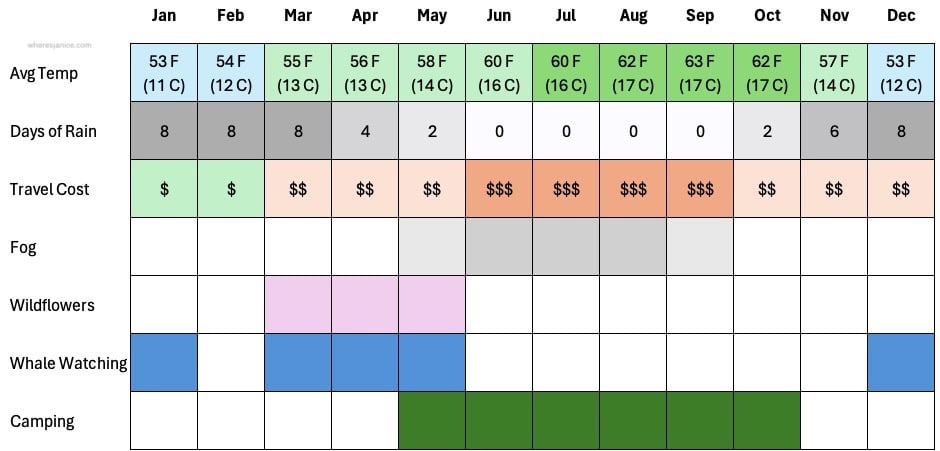
Temperature (F) and Rainfall (in)
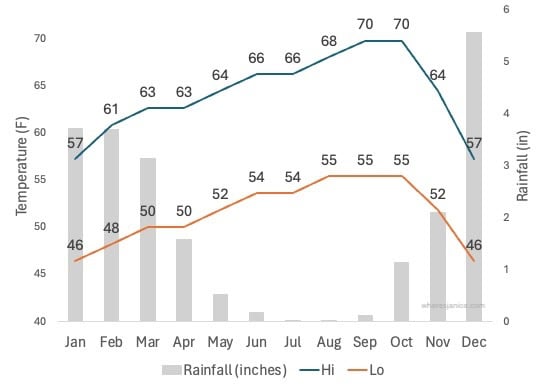
Temperature (C) and Rainfall (cm)
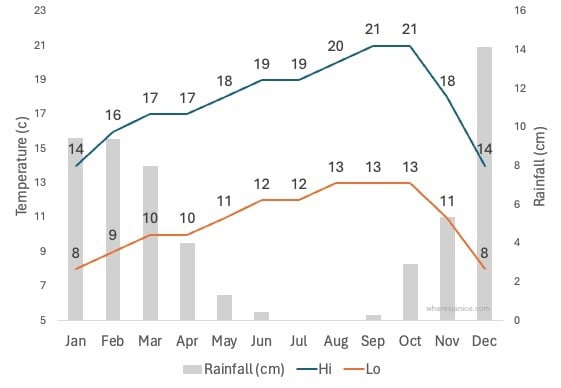
Best month to visit San Francisco for weather – September
Conventionally, the best time to visit San Francisco for the weather is September. With relatively warm weather, low probability of rain, and it being just outside the fog season, it’s easy to see why. You can easily go hiking, walk around in a t-shirt, and enjoy long daylight hours.
Average September weather – the warmest month
- Average Temperature: 63 F (17 C)
- Max Temperature: 70 F (21 C)
- Min Temperature: 52 F (10 C)
- Days of rain: 1 day
Worst time to visit San Francisco – February
Most people agree that the worst time to visit San Francisco is during the winter months, especially February, due to rain storms and potential road closures along the coast as a result.
However, as I mentioned, don’t let this get you down on your travel dates. I’ll be showing you the fun activities you can only find in winter, and how you can make off-peak travel the best decision you’ve made.
Average February weather – the rainy month
- Average Temperature: 54 F (12 C)
- Max Temperature: 61 F (16 C)
- Min Temperature: 42 F (5 C)
- Days of rain: 8 days
Rainy season in San Francisco – November to March
The rainy season in San Francisco is between November and March.
The most rainy months are typically December or January, with maximum rainfall of up to 11.6 inches in a month (Dec 2022). Overall, the winter season just reminds me of these funny song lyrics:
“It never rains in California
But girl, don’t they warn ya?
It pours, man, it pours”
Average rainfall amount (in inches):
- November: 2.1
- December: 5.6
- January: 3.7
- February: 3.7
- March: 3.1
Cheapest month to visit San Francisco – January or February
February is likely the cheapest month to visit San Francisco, with January sometimes taking that spot depending on various factors each year.
Fortunately, plane tickets in February are probably relatively cheap too since this month sees the fewest number of visitors in the whole year. Post-2021, on average February saw 1.3 million visitors boarding at SFO compared to the yearly average of 1.9 million. That’s about 30% fewer people!
In addition, post-2021 hotel occupancy rate is at just 50% during January to February, compared to the annual average of 63%.
The biggest factor is probably the rainy winter weather along with the post-holiday slump as people get back to work and plan summer travels instead.
Passengers boarding at SFO (Post 2021) vs Days of Rain
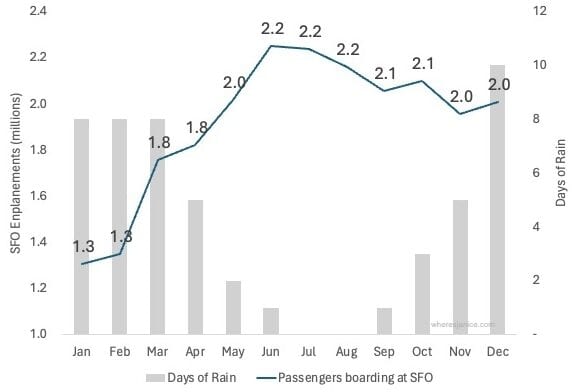
Average Hotel Occupancy Rate (Post-2021) and Price Index (2023)
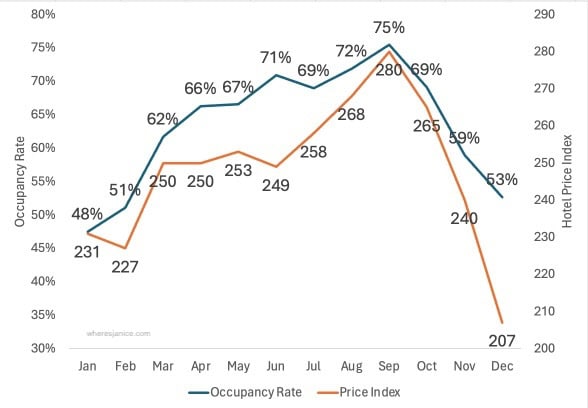
Most expensive month to visit San Francisco – September
September is probably one of the most expensive months to visit San Francisco, where hotel occupancy shoots up to 75% compared to the summer (June to August) average of 70%.
However, plane tickets might start to get cheaper as the number of visitors boarding in SFO starts to dips after the busy summer season.
Since September is one of the best times to visit San Francisco for the weather, it’s not surprising that a few major conferences are also held in this month. They can really drive up hotel prices in the city since San Francisco is not very big. On peak days, you might expect around 16,500 rooms to be booked up just from a conference.
In general, the larger conferences are held in Moscone Center, usually occupying all three venues (North, West, and South). Notably, the Dreamforce by Salesforce is held in September.
Here are some conference and event dates you should look out for when planning your visit:
- J.P. Morgan Health Conference (January)
- NBA All-Star (January 2025)
- American Academy of Orthopaedic Surgeons Annual Meeting (February)
- Game Developers Conference (March)
- RSA Conference (May)
- Snowflake Summit(June)
- Data + AI Summit (June)
- Dreamforce (September)
- American College of Surgeons Clinical Congress (October)

Bonus: Best time to see whales in San Francisco – Winter and Spring
In general, the best time to see whales is between December to May. For example, you might see Gray Whales, Sperm Whales, Orcas, and Killer Whales at this time of year.
Gray Whales are the most commonly-sighted, and the best time to see them is between December to January, or March to May. The next most common type of whale you might see is the Blue Whale, more commonly seen between May to November.
To get a better vantage point for whale watching, you might want to take a trip along the coast. Tours are run frequently in Monterey, and Point Reyes National Seashore offers spectacular viewpoints from the lighthouse.

Here’s what to expect for different months
There are tons of things to do in and around San Francisco, with perks of visiting in each season. Here’s a breakdown of what each season in San Francisco is expected to be like. Once you know the weather and crowds to expect, you’ll be able to plan your trip more efficiently.
December to February (Winter)
Aside from winter being probably the cheapest month to travel, here are some perks that make off-peak travel worth it.
My favorite aspects of winter season
- Hiking peaks in the cool weather
- Tide pooling during King Tides in January and February
- Gushing waterfalls after a period of rain
- Skiing and snowshoeing season after snowstorms
- Yosemite Firefall in February
- Whale watching
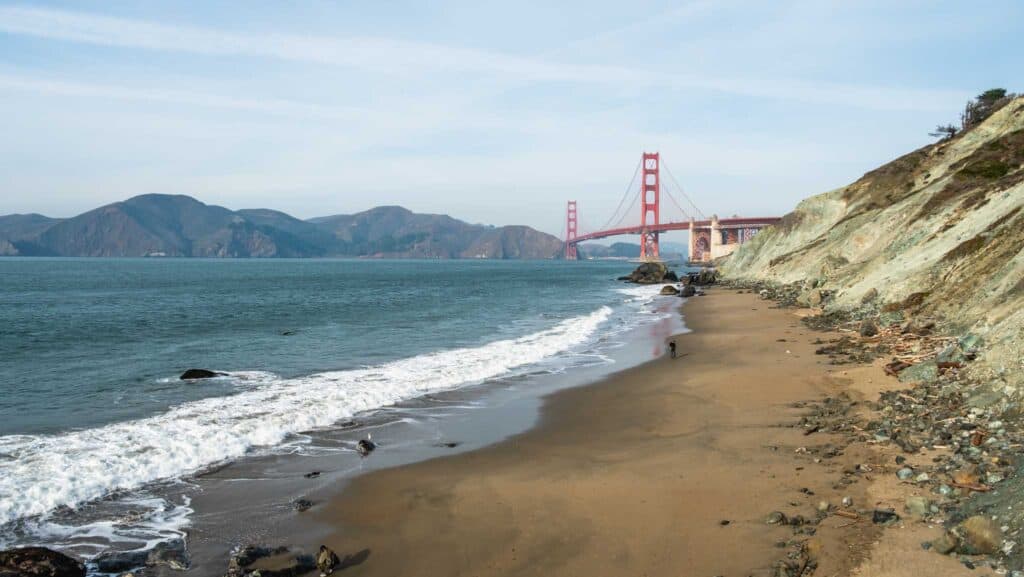
Weather
Did you know that San Francisco’s average temperature in winter is only 10 F (5 C) cooler than in summer? With temperature highs of around 58 F (15 C) and lows of 47 C (8 C), San Francisco offers a relatively mild winter.
This is typically the clearest time of year where you can enjoy fog-free views of the Golden Gate Bridge and various San Francisco sights.
There will be between 8 to 10 days of rain from December to February, where December tends to be the rainiest. We had some high winds accompanying rain storms in February in 2024 which coastal drives less desirable. Some parts of the Bay Area also experienced power outage due to these winds.
Hotel costs and crowds
Fortunately, you’ll be able to find some great hotel deals in winter and enjoy less crowded destinations. Average hotel prices will be around $217 from December to February, according to the Trivago Hotel Index. In addition, occupancy rates are at about 50% which are the year’s lows.
There are about 19% fewer people visiting each month in December to February compared to the yearly average. Although February is the least popular time to visit, there are still about 1.3 million people who boarding at SFO post-2021.
However, there can still be pockets of expensive hotel dates when there are large conferences happening in the city.
Events, holidays, and things to do
On rainy days, consider checking out some indoor activities in San Francisco such as visiting museums and shopping. Some popular museums include the Exploratorium, de Young Fine Arts Museum, California Academy of Sciences, and SF MOMA.
To enjoy the festive season in December, check out the lighting decorations at Union Square, Pier 39, or Ghirardelli Square. You can even go ice skating in the rink at Union Square.
If you’re an NBA fan, look out for any games you might be able to watch in San Francisco. In fact, San Francisco is hosting NBA All-Star 2025 and it’s going to get busy then.
December
- Christmas
- New Years’ Eve
January
- Martin Luther King Jr. Day
- Lunar New Year
- NBA All-Star (January 12-16, 2025)
- J.P. Morgan Health Conference
February
- Washington’s Birthday
- Valentine’s Day
- American Academy of Orthopaedic Surgeons Annual Meeting

California road trip ideas in winter
There’s something magical about visiting Yosemite National Park and Lake Tahoe in winter, especially after days of rain or snow storms. Lake Tahoe is a skiing haven, with lots of cozy vacation rentals to huddle in even if the weather turns.
Yosemite Valley doesn’t always have much snow as it melts quickly after the storm, but you can still see snow-covered granite peaks all around you. You can also head up to Badger Pass Ski Area, or go snowshoeing along Glacier Point Road.
In most years, you can access most of Big Sur‘s attractions from the north side of Highway 1. Make sure to check for any road closures though, as sometimes rock or mudslides can happen during a storm. No matter the weather, Carmel-by-the-Sea is a lovely place to enjoy wine tasting, dining in award-winning restaurants, and visiting art galleries.
If you want to go whale watching, I recommend checking out Point Reyes National Seashore, or joining a tour at Monterey. You could also spend a day at the Monterey Bay Aquarium to learn more about the marine biodiversity.
Did you know that Monterey has excellent whale watching opportunities given the natural submarine canyon located just slightly off the coast?
Book your whale watching tour in advance here!
March to May (Spring)
The early buds on trees indicate that spring is upon us. Birds chirp a little more merrily, and sunnier days mark the start of the year’s outdoor adventures.

My favorite aspects of spring season
- Green grass and wildflowers everywhere, with chances of a Superbloom
- Great time to see waterfalls, especially in Yosemite National Park
- Warmer winter/early spring adventures in the mountains
- Start of regular camping and backpacking season
Weather
After March, the amount of rain drastically decreases and you’ll almost feel like summer is beginning. March starts with 8 days of rain, which reduces to 4 days in April, and then just 2 days in May. As wildflowers start to bloom, you’ll have plenty of sunny days to head out and enjoy them.
You can expect temperature highs of around 63 F (17 C) and lows of 51 C (10 C) in San Francisco. Fog season starts to roll in from May, but it’ll be nothing compared to the summer’s fog. This one’s called May Gray.
Hotel costs and crowds
Hotel rates in spring are mostly consistent from March to May, with average hotel prices ranging around $252 according to the Trivago Hotel Index. Occupancy rates start to rise too, averaging 65% post-2021.
March sees a 20-30% uptick in visitors compared to February, which stays roughly consistent till April. The next rise in visitors happens from April to May, usually by about 10%. At this time, there’s about 2 million visitors who come through SFO in May.
With just 2 days of rain on average, doesn’t May sound like the ideal time to visit?
Events, holidays, and things to do
Some of San Francisco’s hiking trails are best explored in Spring because of fewer crowds. This is also one of the best times to catch a sight of the majestic Golden Gate Bridge.
I recommend checking out Land’s End Trail, or the Batteries To Bluffs Trail which offer a more rugged view of the red bridge from the coastline.
Spring is also the best time to see flowers in the city, and you can participate in events like the Cherry Blossom Festival and Union Square in Bloom.
March
- Daylight Savings Time begins (second Sunday)
- Saint Patrick’s Day
- Union Square in Bloom
- Game Developers Conference
April
- Cherry Blossom Festival
May
- Memorial Day
- RSA Conference
- Bay to Breakers

California road trip ideas in Spring
As the snow starts to melt in the mountains, waterfalls in Yosemite National Park get more impressive in Spring. If you’re visiting in May, Glacier Point Road and even Tioga Pass might be open by then, allowing you to cross over to the Eastern Sierra. It’s still shoulder season in May, so I recommend a road trip to Yosemite.
Coastal drives are your stereotypical California dream – imagine cruising down Big Sur in a fancy vintage car, with the wind in your hair. If you like lilies, you’ll also enjoy the Calla Lily Valley near Garrapata State Park. If you have 3 days, consider a road trip to Monterey, Carmel, and Big Sur.
You can even drive up towards the northern coast to explore Point Reyes National Seashore, Bodega Bay, and Mendocino.
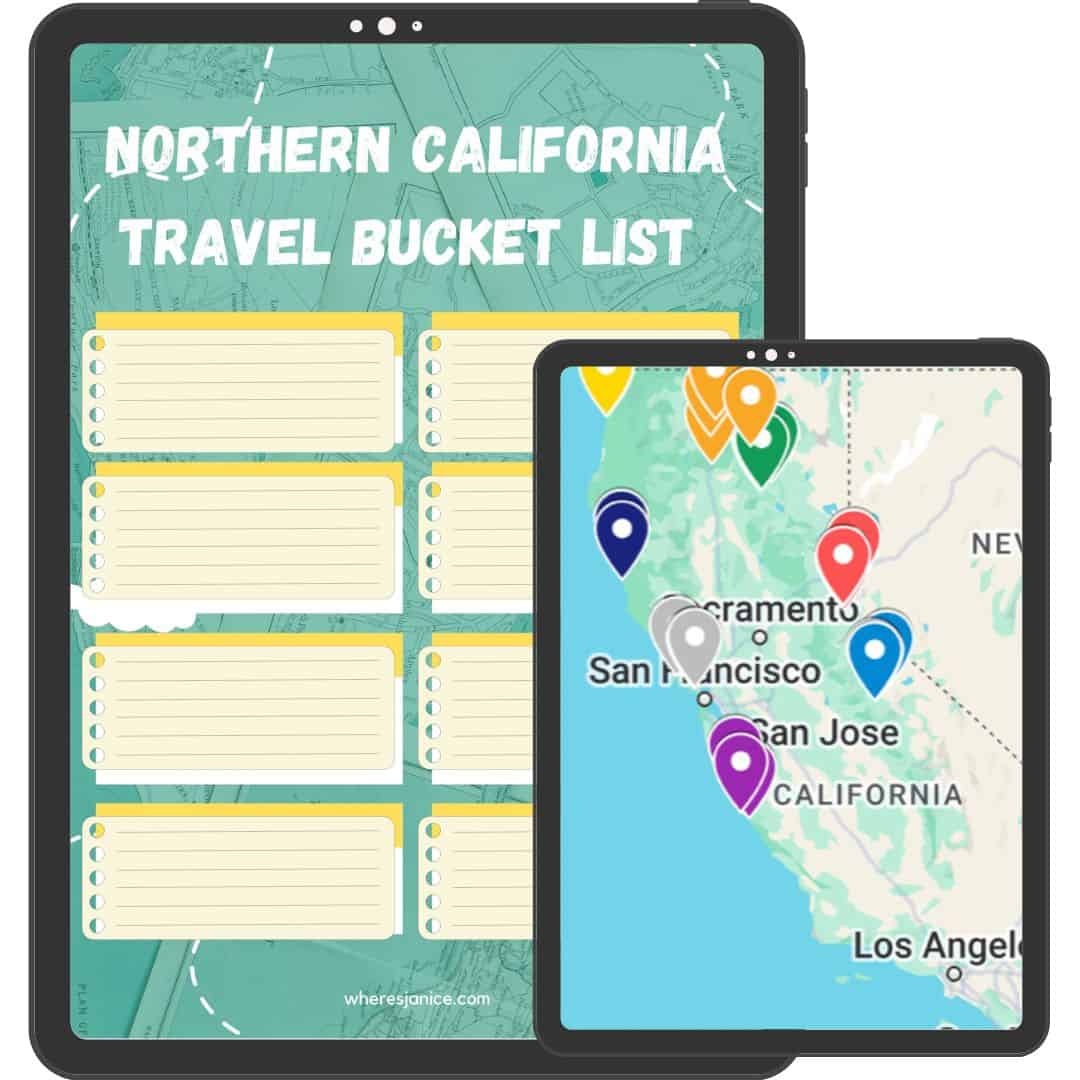
June to August (Summer)
San Francisco enjoys a “Mediterranean summer” where summers are warm and dry. It never really gets too hot, and it’s a great time to be out in the sun. Along with the usual summer vacation days, this is usually the busiest time of year.

My favorite aspects of summer season
- Everyday is beach day
- Lots of events
- Long daylight hours
Weather
Summer in San Francisco is mostly dry, with practically 0 days of rain between June and August. That’s crazy to me, as someone who grew up with the monsoon season in Asia.
With temperature highs of 67 F (19 C) and lows of 54 F (12 C), you’ll love that every day can be beach day. The hottest days in summer only get up to 70 F (21 C), which is not a big deal at all.
However, summer is when the fog rolls around more often, which helps to keep the city cool. Each month’s fog gets its own name – June Gloom, No Sky July, and Fogust.
Hotel costs and crowds
Surprisingly, hotel rates in summer are not as high as the crowds suggest, where average hotel prices are just around $258 according to the Trivago Hotel Index. The occupancy rates are at 71% and the number of visitors coming through SFO is the highest in June, and an average of 2.2 million people per month in summer.
My guess is that people are spending more time outside San Francisco and going on road trips since summer is prime time for going on outdoor adventures. However, other destinations will see higher hotel prices given the peak travel period, including Carmel-by-the-Sea and Yosemite National Park.
Flight tickets are also most expensive at this time based on personal experience, since we relocated from Singapore to California in summer. In addition, if you’re hoping to redeem airline miles (especially if it’s Singapore Airlines) for this time of year, I recommend doing so a year in advance.

Events, holidays, and things to do
If you’re hoping to immerse yourself in some local activities in summer, here are some that you can look forward to. Personally, I’m drawn to San Francisco’s Jazz festivals since it has played a big role in the city’s history.
June
- Juneteenth
- San Francisco Jazz Festival
- Snowflake Summit
- Data + AI Summit
July
- Independence Day
- Filmore Jazz Festival
August
- Outside Lands
- Shakespeare in the Park
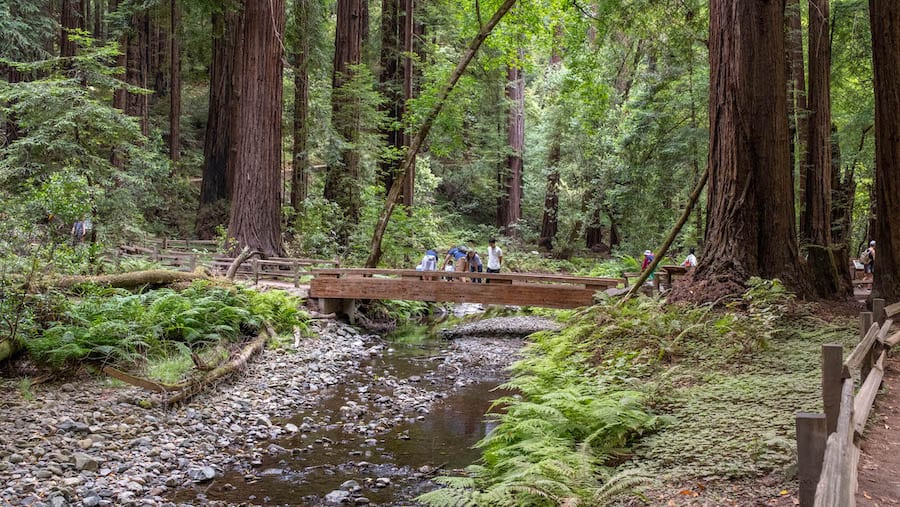
California road trip ideas in Summer
Lake Tahoe, Yosemite National Park and Lassen Volcanic National Park are some amazing places to visit, now that much of the snow has melted and you’re free to access most roads in each destination. For example, you can watch the sunset at this amazing spot in Yosemite.
One really fun road trip idea would be to drive through Tioga Pass at Yosemite that goes towards the Eastern Sierra side where you’ll find Highway 395.
You can access so many amazing alpine lakes, including Mammoth Lake, Mono Lake, Big Pine Lake, and more. This side of California is also known for having several hot springs you can drive to, and there are lots of dispersed camping along the highway where you can camp for free.
If you’re looking to go camping or backpacking, summer season is the best time for it. You can look at getting permits for Yosemite’s trails in the High Sierra, and also in Lake Tahoe’s Desolation Wilderness.
For a quick day trip from the city, Muir Woods National Monument offers a shaded adventure beneath the huge redwood trees. It’s one of the best places to see these magnificent old growth trees within the Bay Area.
Here are some Muir Woods tours you can check out!
September to November (Fall)
Fall is the goldilocks season for visiting San Francisco. You get warm and mostly dry weather but without the summer crowds. That’s why I recommend September as the best month to visit San Francisco.

My favorite aspects of fall season
- Pumpkin and sunflower picking
- Winery harvest season
- Peak fall colors
- Warm weather with fewer crowds
Weather
It might be counterintuitive, but the hottest months to visit San Francisco are in September and October during the fall season. People also call this the “Indian Summer”.
During these two months the average temperature is 63 F (17 C), with highs of 70 F (21 C) and lows of 55 F (13 C). In recent years, the warmest recorded temperature was 76 F (24 C) in 2017. November starts to get much cooler, with a high of 64 F (18 C) and low of 52 F (11 C).
The rain returns from October onwards, starting with 2 days on average, and increases to 6 days in November. As the fog becomes less frequent, it’s prime time to check out the various Bay views while the weather is still warm and dry.
Hotel costs and crowds
Despite having fewer tourists, hotel rates in September are highest in the year, likely due to the large scale nature of the Dreamforce event by Salesforce. This is also the time where you’ll see the highest occupancy rates for hotels, where it was 75% post-2021.
Average hotel prices peak in September at about $280, then falling quickly to $265 and $240 in October and November respectively. Fortunately, you’re likely to enjoy discounted prices outside the city as you head out on your road trips in fall.
The number of people coming through SFO are lower compared to summer, though similar to the crowds in May.
Events, holidays, and things to do
There’s a lot going on in the San Francisco Bay Area during fall, with lots of activities worth driving out to nearby. For example, Half Moon Bay holds the famous Fall Pumpkin Festivals and you can even go Sunflower picking in bright yellow fields.
This is also a great time to enjoy the various wineries’ harvest season, perhaps by taking a trip out to Napa Valley, or by going wine tasting. Keep an eye out for the gorgeous fall colors closer to November too.
Check out these Napa Valley tours and book in advance!
September
- Labor Day
- Dreamforce
- Ghirardelli Chocolate Festival
October
- Fleet Week
- Halloween
- American College of Surgeons Clinical Congress
November
- Thanksgiving
- San Francisco International Auto Show
- Daylight Savings Time ends

California road trip ideas in Fall
If you’re heading to Lake Tahoe in fall, don’t miss Apple Hill, a region where you’ll have the chance to pick apples from the orchards. On our way back, we visited Rainbow Orchards and tried some apple cider donuts which were amazing.
The June Lake Loop along Highway 395 is one of the popular sites for leaf peeping opportunities in October. For something closer to the Bay Area, a drive down to Carmel-by-the-Sea and Big Sur would be to enjoy the coastal charm without the crowds.
Yosemite’s Glacier Point Road and Tioga Pass are typically open till November, as that’s approximately when the first snowfall in higher elevation arrives.
From our experience, camping in either Lake Tahoe or Yosemite starts to get into the cold-weather territory as temperatures drop at night. This is the ideal time to camp in Big Sur, just like what we did in November in this itinerary.


To sum it up – When’s the best time to visit San Francisco?
- Best time for beginners looking to go camping: July or August (Summer)
- Best time for exploring San Francisco and its events: September (Fall)
- Best time for enjoying flowers and waterfalls: April (Spring)
- Best time for whale watching and skiing: March (Winter)
Given that San Francisco has pretty mild and pleasant weather all year, I’d say we have become quite picky compared to while we were living in a tropical country. Any month can easily be the best time to visit San Francisco if you’re trying to escape extreme weather elsewhere.
California’s weather is amazing throughout, and I would recommend a visit here no matter the time of year. I’ve had my favorite road trips and camping experiences during off-peak, and enjoyed exploring places without the crowds. At the same time, I appreciate the longer daylight and more open roads in summer too.
In terms of cost, there’s so much value in off-peak travel especially if you’re heading out on a road trip to the National Parks. Finally, if you’re visiting for a conference or event, embrace the vibrant San Francisco culture!
More of my travel guides to help you plan your classic California experience
Lassen Volcanic | Lake Tahoe | Yosemite | Point Reyes | San Francisco Day Trips | Half Moon Bay | Pescadero | Big Sur | Santa Cruz | Monterey | Carmel-by-the-Sea | Catalina Island | Death Valley | 10-day California Road Trip | Rental car tips | Bay Area Must-Visit Places
Not sure where to start? I have some ideas for your California trip!
Best stops along California’s coast | Must-go for outdoor lovers | Best winter camping | Bucket-list backpacking trips | Best SF Bay Area hikes | Best California Glamping | Best beach towns





